multivitamin support

free shipping over $100 (USA & Canada)
1-877-937-4372 the pet expert hotline
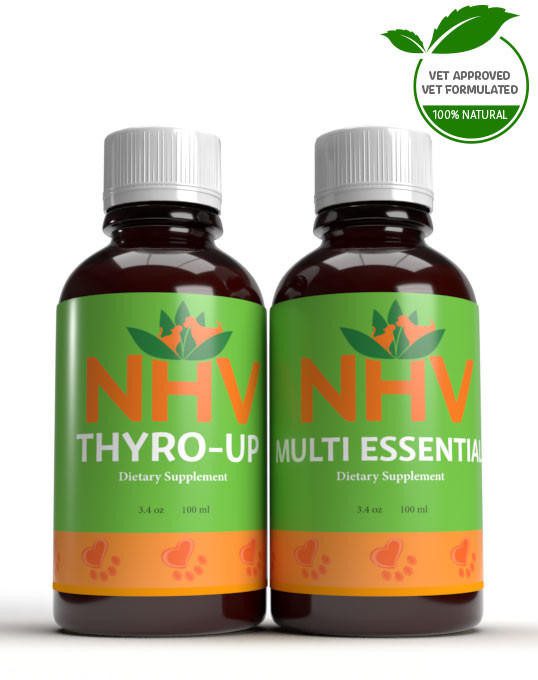

Hypothyroidism in dogs is one of the most common diseases we see at the Animal Wellness Clinic (Dr. Cook’s veterinary practice). A thorough understanding of the disease and the symptoms will help with early diagnosis and treatment.
Below is an explanation of the complicated and all-encompassing disease of hypothyroidism in dogs.
The thyroid gland is part of the endocrine system, a butterfly-shaped gland located in the neck, just below the larynx, and partially wrapped around the trachea. It secretes two major hormones, thyroxine (T4) and to a lesser degree, triiodothyronine (T3). When T4 is absorbed into tissue cells, it is converted into T3. Most of the circulating T4 is carried by blood proteins and is not available for tissue absorption, the portion that is not carried by proteins (free T4) is the portion able to enter tissues for activation.
Production of T4 is regulated by the pituitary gland at the base of the brain. The pituitary secretes a substance called TSH. When T4 levels are dropping, the pituitary gland stimulates the thyroid gland to make and release more T4. Virtually, every cell in the body can be affected by reduced levels of thyroid hormone.
Low thyroid levels lead to symptoms in multiple body systems. Below are some of the systems that are affected and symptoms pet parents should look out for:
Left untreated, any number of these disorders can dramatically shorten your pet’s life.
Left untreated, any number of the above disorders or symptoms can dramatically shorten a dog’s life and certainly decreases their quality of life.
Genetics and autoimmune disease of the thyroid gland cause a predisposition for hypothyroidism. There are also many environmental factors, such as diet/nutrition and exposure to toxins or chemicals that can trigger hypothyroidism in dogs.
Diagnosing hypothyroidism can be complex and includes a good physical exam, the presence of clinical signs or symptoms, and special blood tests that measure the amount of T3 and T4 (and other related hormones) in the bloodstream.
Antibodies against the thyroid can be measured if an autoimmune cause is suspected. Your vet can perform these tests and determine if your dog is hypothyroid.
Treatment of hypothyroidism is relatively easy and most patients only need to take a small tablet of replacement thyroid hormone twice daily. Lifelong supplementation is usually required and blood tests to monitor thyroid levels are recommended at specific intervals throughout treatment. In many cases, clinical signs and symptoms begin to resolve within the first month of treatment but chronic cases may take longer to show improvement.
There are also natural supplements, like NHV Thyro-Up that can be added to improve medication effectiveness and even help lower the dose of medication. The herbs in NHV Thyro-up help dogs with hypothyroidism by helping to balance the thyroid, stimulating the immune system, and providing essential vitamins and nutrients.
Since with thyroid disease, there is a deficiency in nutritional intake, using a multivitamin like NHV Multi Essentials, and adding a high-grade fish oil supplement, like NHV PetOmega 3 will also be helpful.
The purpose of these supplements is to support the thyroid gland by increasing metabolism and lessening any symptoms of hypothyroidism.
If your dog has hypothyroidism, and you would like a second opinion, please contact us for online consultation with one of our pet experts.
multivitamin support

Herbal Digestive Aid, Energy Booster, and Multivitamin for Dogs
buy 2 and save $3
3 month supply for a small to medium size pet
NHV’s multivitamins for dogs targets the brain, stomach, major arteries, kidneys, and liver with a powerful blend of herbal support.

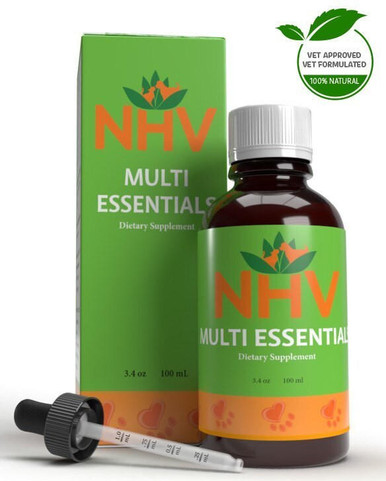
NHV’s multivitamins for dogs targets the brain, stomach, major arteries, kidneys, and liver with a powerful blend of herbal support.

Millions of people take multivitamins daily to support their health, and it only makes sense our canine companions can benefit just as much. This 100% natural plant-based liquid blend can help your dog with nutritional deficiencies.
Signs of Possible Vitamin Deficiency in Dogs
NHV’s Multi-Essentials are packed with herbs that are rich in vitamins and minerals. This vet-formulated blend is designed to benefit your dog’s health using all-natural organically grown herbs with no additives or preservatives.
Even if your pet is healthy, supplying a multivitamin is essential to maintain good health, and some pets need more vitamins and minerals than others. For more, read NHV’s blog, vet talk with Dr. Hillary Cook.
Benefits of NHV’s Multivitamins for Dogs
You can read NHV's blog about the importance of dog vitamin supplements. All pets can benefit from NHV’s Natural Pet Product, even small exotic pets.
If you have questions about plant-based supplements including our multivitamins for dogs, you can schedule a consultation with one of our highly trained holistic veterinarians, because, at NHV, total health and wellness for all pets is our top priority.
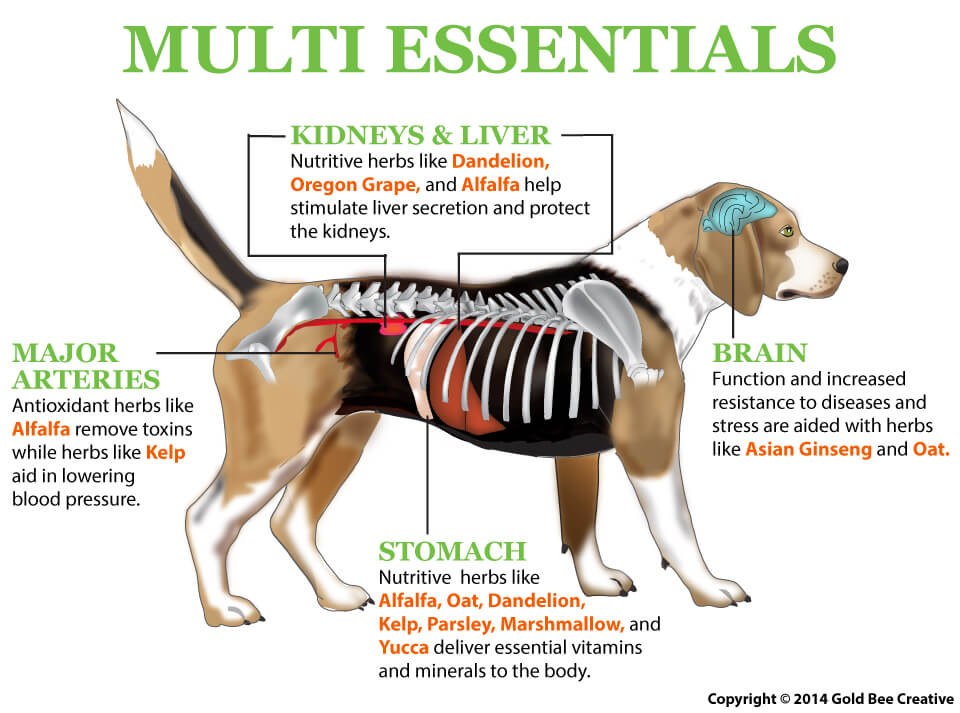
Select your pet's weight to determine the correct dose.
To be taken twice daily. Determine your pet’s weight and then use the easy chart below to determine the correct dose. This is the minimum dosage.
Pet's Weight Dosage
0 - 15 lb = 0.5 ml
16 - 30 lb = 1.0 ml
31 - 45 lb = 1.5 ml
46 - 60 lb = 2.0 ml
61 - 75 lb = 2.5 ml
Over 75 lb = 3.0 ml
How to Administer
Shake well before use. The easiest method is to use the dropper provide and places the drops into your pet’s food or favorite treat. You can also use the dropper and squirt directly into the pet’s mouth.
Some pets can be finicky, if this occurs consider hiding the drops in foods most pet’s love such as fish, chicken or yogurt or a favourite treat. If your pet only eats dry food then soak a few kibbles at feeding time.
For Best Results
Herbal dietary supplements are beneficial to the health and wellbeing of your pet and are safe for long-term use. Every pet responds to natural herbal supplements differently, therefore it is important to be consistent and administer the product daily. Supplements generally take two to four weeks to take effect, however this will vary from one animal to the next.
Product Storage
All NHV Natural Pet Products are pure herbal extracts and contain no artificial additives, preservatives or coloring. Shelf life after opening is 6 months and must be refrigerated after opening.
Cautions and Contraindications
Do not use Multi Essentials in pregnant or nursing animals. Speak to your vet before using our products. A second visit is recommended if your pet’s condition does not improve, or deteriorates after continued use of the supplements.
All information provided by NHV Natural Pet Products is for educational purposes only.
Millions of people take multivitamins daily to support their health, and it only makes sense our canine companions can benefit just as much. This 100% natural plant-based liquid blend can help your dog with nutritional deficiencies.
Signs of Possible Vitamin Deficiency in Dogs
NHV’s Multi-Essentials are packed with herbs that are rich in vitamins and minerals. This vet-formulated blend is designed to benefit your dog’s health using all-natural organically grown herbs with no additives or preservatives.
Even if your pet is healthy, supplying a multivitamin is essential to maintain good health, and some pets need more vitamins and minerals than others. For more, read NHV’s blog, vet talk with Dr. Hillary Cook.
Benefits of NHV’s Multivitamins for Dogs
You can read NHV's blog about the importance of dog vitamin supplements. All pets can benefit from NHV’s Natural Pet Product, even small exotic pets.
If you have questions about plant-based supplements including our multivitamins for dogs, you can schedule a consultation with one of our highly trained holistic veterinarians, because, at NHV, total health and wellness for all pets is our top priority.

Select your pet's weight to determine the correct dose.
To be taken twice daily. Determine your pet’s weight and then use the easy chart below to determine the correct dose. This is the minimum dosage.
Pet's Weight Dosage
0 - 15 lb = 0.5 ml
16 - 30 lb = 1.0 ml
31 - 45 lb = 1.5 ml
46 - 60 lb = 2.0 ml
61 - 75 lb = 2.5 ml
Over 75 lb = 3.0 ml
How to Administer
Shake well before use. The easiest method is to use the dropper provide and places the drops into your pet’s food or favorite treat. You can also use the dropper and squirt directly into the pet’s mouth.
Some pets can be finicky, if this occurs consider hiding the drops in foods most pet’s love such as fish, chicken or yogurt or a favourite treat. If your pet only eats dry food then soak a few kibbles at feeding time.
For Best Results
Herbal dietary supplements are beneficial to the health and wellbeing of your pet and are safe for long-term use. Every pet responds to natural herbal supplements differently, therefore it is important to be consistent and administer the product daily. Supplements generally take two to four weeks to take effect, however this will vary from one animal to the next.
Product Storage
All NHV Natural Pet Products are pure herbal extracts and contain no artificial additives, preservatives or coloring. Shelf life after opening is 6 months and must be refrigerated after opening.
Cautions and Contraindications
Do not use Multi Essentials in pregnant or nursing animals. Speak to your vet before using our products. A second visit is recommended if your pet’s condition does not improve, or deteriorates after continued use of the supplements.
All information provided by NHV Natural Pet Products is for educational purposes only.
overall vitality

For Overall Health and Well-Being
buy 2 and save $3
Support your dog’s health with omega 3 fish oil for dogs. Help them maintain a healthy coat, eyes, joints, immune system and overall organ function.


Support your dog’s health with omega 3 fish oil for dogs. Help them maintain a healthy coat, eyes, joints, immune system and overall organ function.

Our omega 3 fish oil for dogs is a great source of EPA (Eicosapentaenoic Acid 600mg) and DHA (Docosahexaenoic acid 460mg) essential fatty acids. This fish oil supplement for dogs is derived from sardines, anchovies and North Atlantic cod liver oil. It is molecularly distilled and cold pressed to improve the bioavailability of the omega 3 fatty acids, and is medical and human grade quality.
Omega 3 fish oil for dogs may be beneficial for the following:
Processed pet foods have increased omega-6 fatty acids, and decreased omega-3 fatty acids. The University of Maryland Medical Center states, "It is very important to maintain a balance between omega-3 and omega-6 fatty acids in the diet. A proper balance helps maintain and even improve health." Your dog’s body cannot easily make essential fatty acids. It is vital to provide omega 3 fish oil for dogs as an added supplement to your pet’s daily diet.
The American Journal of Veterinary Medicine has published studies on the benefits of omega 3 fatty acids (fish oils) for arthritis and degenerative joint disease in dogs. The studies showed that dogs who were given omega 3 fatty acids had a significantly improved ability to get up from a resting position and marked improvement in walking ability.
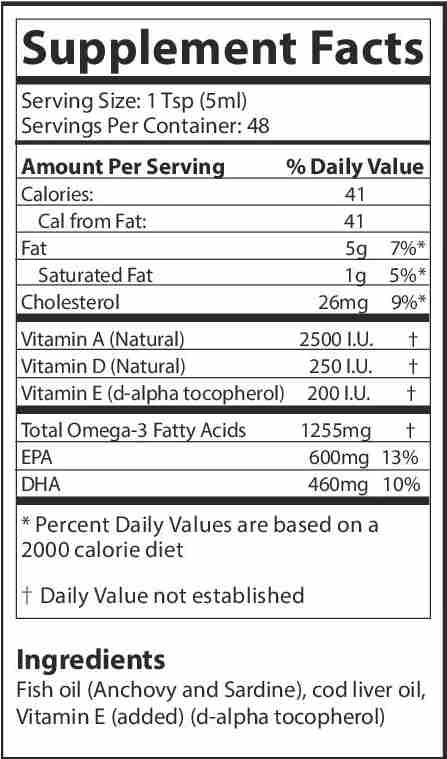
Suggested Dosage: To be taken once per day. Add to food based on weight chart.
Therapeutic Dosage: Double the quantity for maximum period of 4 weeks or follow veterinarian advise.
Pet’s Weight Dosage
0-15 lb = ¼ tsp
15-30 lb = ½ tsp
30-60 lb = 1 tsp
60-90 lb = 1 ½ tsp
How to Administer: Shake well before use. The easiest method is to add the dosage to your pets food. Some pets can be finicky, if this occurs consider hiding the appropriate amount in food most pet’s love such as fish, chicken, yogurt, or a favorite treat. If your pet only eats dry food then soak kibbles at feeding time.
For Best Results
Dietary supplements are beneficial to the health and well-being of your pet and are safe for long-term use. Every pet responds to natural supplements differently, therefore it is important to be consistent and administer the product daily. Supplements generally take two to four weeks to take effect, however this will vary from one animal to the next.
Product Storage
All NHV Natural Pet Products contain no artificial additives, preservatives or coloring. Shelf life after opening is 6 months and must be refrigerated after opening.
Cautions and Contraindications
Avoid During Pregnancy.
Our omega 3 fish oil for dogs is a great source of EPA (Eicosapentaenoic Acid 600mg) and DHA (Docosahexaenoic acid 460mg) essential fatty acids. This fish oil supplement for dogs is derived from sardines, anchovies and North Atlantic cod liver oil. It is molecularly distilled and cold pressed to improve the bioavailability of the omega 3 fatty acids, and is medical and human grade quality.
Omega 3 fish oil for dogs may be beneficial for the following:
Processed pet foods have increased omega-6 fatty acids, and decreased omega-3 fatty acids. The University of Maryland Medical Center states, "It is very important to maintain a balance between omega-3 and omega-6 fatty acids in the diet. A proper balance helps maintain and even improve health." Your dog’s body cannot easily make essential fatty acids. It is vital to provide omega 3 fish oil for dogs as an added supplement to your pet’s daily diet.
The American Journal of Veterinary Medicine has published studies on the benefits of omega 3 fatty acids (fish oils) for arthritis and degenerative joint disease in dogs. The studies showed that dogs who were given omega 3 fatty acids had a significantly improved ability to get up from a resting position and marked improvement in walking ability.

Suggested Dosage: To be taken once per day. Add to food based on weight chart.
Therapeutic Dosage: Double the quantity for maximum period of 4 weeks or follow veterinarian advise.
Pet’s Weight Dosage
0-15 lb = ¼ tsp
15-30 lb = ½ tsp
30-60 lb = 1 tsp
60-90 lb = 1 ½ tsp
How to Administer: Shake well before use. The easiest method is to add the dosage to your pets food. Some pets can be finicky, if this occurs consider hiding the appropriate amount in food most pet’s love such as fish, chicken, yogurt, or a favorite treat. If your pet only eats dry food then soak kibbles at feeding time.
For Best Results
Dietary supplements are beneficial to the health and well-being of your pet and are safe for long-term use. Every pet responds to natural supplements differently, therefore it is important to be consistent and administer the product daily. Supplements generally take two to four weeks to take effect, however this will vary from one animal to the next.
Product Storage
All NHV Natural Pet Products contain no artificial additives, preservatives or coloring. Shelf life after opening is 6 months and must be refrigerated after opening.
Cautions and Contraindications
Avoid During Pregnancy.
hypothyroidism support
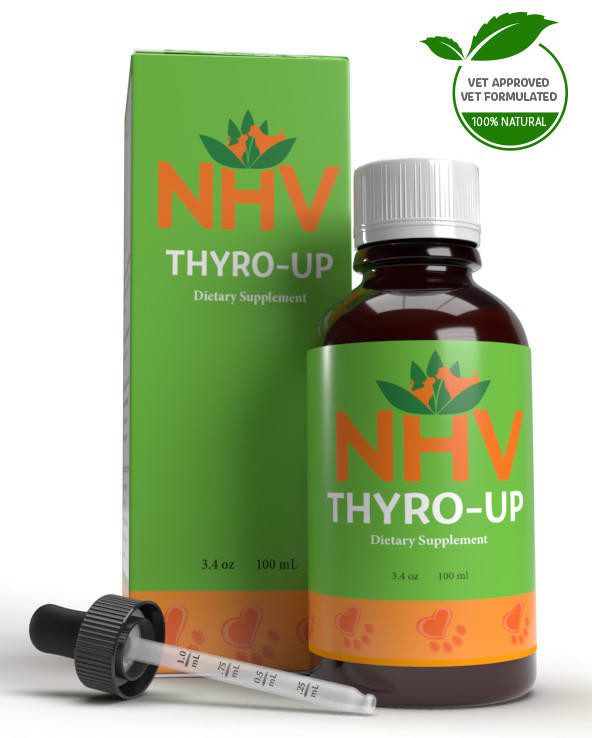
Support for Dogs with Hypothyroidism
buy 2 and save $3
3 month supply for a small to medium size
Support your pet’s hypothyroidism with Thyro-Up, an all-natural dog thyroid supplement that helps boost energy and may help promote normal hormone levels within the thyroid gland.
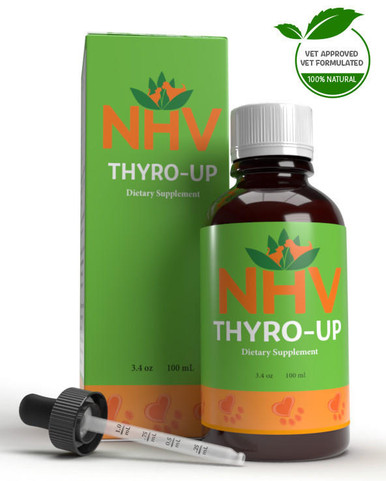
Support your pet’s hypothyroidism with Thyro-Up, an all-natural dog thyroid supplement that helps boost energy and may help promote normal hormone levels within the thyroid gland.
Powerful Thyroid Support for Your Dog
Hypothyroidism can be a real bummer for dogs. It’s a condition that primarily affects older dogs, and comes with symptoms like weight gain, loss of appetite, sluggishness, and hair loss. In addition to the medication prescribed by your pet’s vet, a natural thyroid supplement for your dog can help give them comprehensive support. Thyro-Up is used to support hypothyroidism in dogs.
How Thyro-Up Can Help Your Dog with Hypothyroidism
NHV supplements are formulated with ingredients that are powerful, yet easy on your pet’s body. Thyro-Up is a thyroid supplement for dogs made with ingredients like Gotu Kola, Kelp, Astragalus, and Eleuthero. These plant-based extracts help balance hormones, stimulate an underactive thyroid gland, empower the immune system, and keep a healthy metabolism.
Thyro-Up is safe to take with conventional medicines, and safe to take long-term. Use it together with treatment prescribed by your dog’s veterinarian for comprehensive and effective support.
Use Thyro-Up for Comprehensive Support
Help support your dog’s thyroid function and maintain natural thyroid hormone production with Thyro-Up, an all-natural dog thyroid supplement developed by veterinarians with 20+ years of experience. Have questions? Contact us on the pet expert hotline at 1-877-9374372.
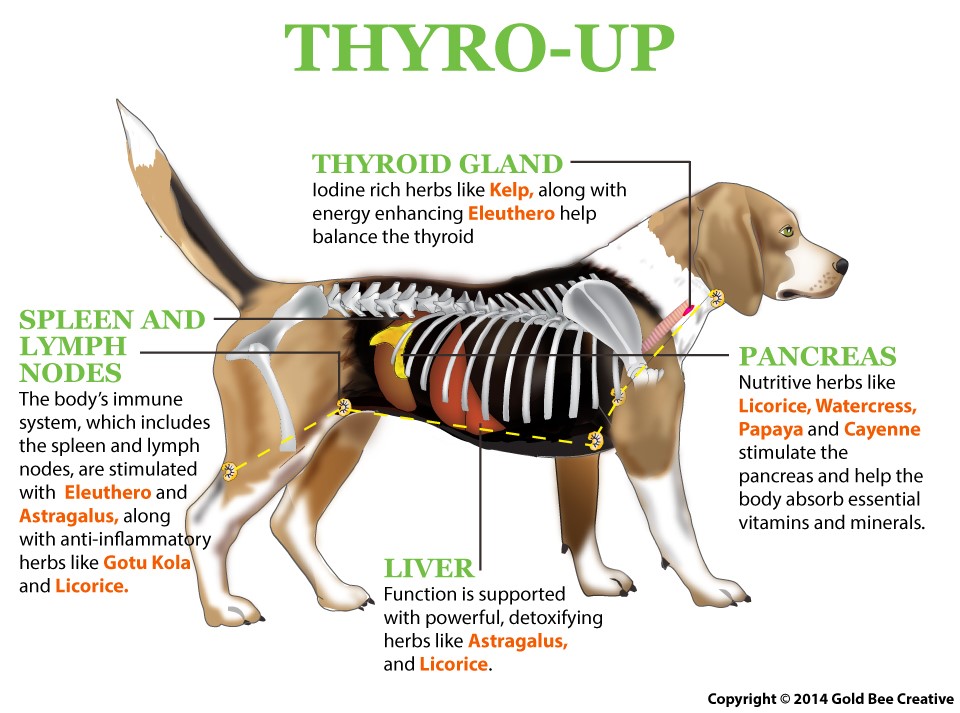
Eleuthero – Helps balance the thyroid and maintain a healthy metabolism.
Kelp – This iodine-rich ingredient stimulates the underactive thyroid gland.
Astragalus – A sweet tonic herb that helps support the thyroid gland and maintains the immune and circulatory systems.
Gotu Kola – A mild diuretic that helps balance hormones. High in antioxidants and beneficial to the skin and coat.
Ginkgo – A kidney tonic that helps maintain body temperature. Supports the cardiovascular and nervous systems.
Licorice – A natural anti-inflammatory with immune-supporting properties.
Watercress – A vitamin and mineral-rich plant that supports digestion.
Papaya – Helps aid digestion and the absorption of nutrients from food.
Cayenne – Helps support the circulatory and digestive systems.
Select your pet's weight to determine the correct dose.
To be taken twice daily. Determine your pet’s weight and then use the easy chart below to determine the correct dose. This is the minimum dosage.
Pet's Weight Dosage
0 - 15 lb = 0.5 ml
16 - 30 lb = 1.0 ml
31 - 45 lb = 1.5 ml
46 - 60 lb = 2.0 ml
61 - 75 lb = 2.5 ml
Over 75 lb = 3.0 ml
How to Administer
Shake well before use. The easiest method is to use the dropper provide and places the drops into your pet’s food or favorite treat. You can also use the dropper and squirt directly into the pet’s mouth.
Some pets can be finicky, if this occurs consider hiding the drops in foods most pet’s love such as fish, chicken or yogurt or a favorite treat. If your pet only eats dry food then soak a few kibbles at feeding time.
For Best Results
Herbal dietary supplements are beneficial to the health and wellbeing of your pet and are safe for long-term use. Every pet responds to natural herbal supplements differently, therefore it is important to be consistent and administer the product daily. Supplements generally take two to four weeks to take effect, however this will vary from one animal to the next.
Product Storage
All NHV Natural Pet Products are pure herbal extracts and contain no artificial additives, preservatives or coloring. Shelf life after opening is 6 months and must be refrigerated after opening.
Cautions and Contraindications
Do not use Thyro-Up in pregnant or nursing animals.
Do not use if your pet has hyperthyroidism (over active thyroid gland). Speak to your vet before using our products. A second visit is recommended if your pet’s condition does not improve, or deteriorates after continued use of the supplements.
All information provided by NHV Natural Pet Products is for educational purposes only.
Powerful Thyroid Support for Your Dog
Hypothyroidism can be a real bummer for dogs. It’s a condition that primarily affects older dogs, and comes with symptoms like weight gain, loss of appetite, sluggishness, and hair loss. In addition to the medication prescribed by your pet’s vet, a natural thyroid supplement for your dog can help give them comprehensive support. Thyro-Up is used to support hypothyroidism in dogs.
How Thyro-Up Can Help Your Dog with Hypothyroidism
NHV supplements are formulated with ingredients that are powerful, yet easy on your pet’s body. Thyro-Up is a thyroid supplement for dogs made with ingredients like Gotu Kola, Kelp, Astragalus, and Eleuthero. These plant-based extracts help balance hormones, stimulate an underactive thyroid gland, empower the immune system, and keep a healthy metabolism.
Thyro-Up is safe to take with conventional medicines, and safe to take long-term. Use it together with treatment prescribed by your dog’s veterinarian for comprehensive and effective support.
Use Thyro-Up for Comprehensive Support
Help support your dog’s thyroid function and maintain natural thyroid hormone production with Thyro-Up, an all-natural dog thyroid supplement developed by veterinarians with 20+ years of experience. Have questions? Contact us on the pet expert hotline at 1-877-9374372.

Eleuthero – Helps balance the thyroid and maintain a healthy metabolism.
Kelp – This iodine-rich ingredient stimulates the underactive thyroid gland.
Astragalus – A sweet tonic herb that helps support the thyroid gland and maintains the immune and circulatory systems.
Gotu Kola – A mild diuretic that helps balance hormones. High in antioxidants and beneficial to the skin and coat.
Ginkgo – A kidney tonic that helps maintain body temperature. Supports the cardiovascular and nervous systems.
Licorice – A natural anti-inflammatory with immune-supporting properties.
Watercress – A vitamin and mineral-rich plant that supports digestion.
Papaya – Helps aid digestion and the absorption of nutrients from food.
Cayenne – Helps support the circulatory and digestive systems.
Select your pet's weight to determine the correct dose.
To be taken twice daily. Determine your pet’s weight and then use the easy chart below to determine the correct dose. This is the minimum dosage.
Pet's Weight Dosage
0 - 15 lb = 0.5 ml
16 - 30 lb = 1.0 ml
31 - 45 lb = 1.5 ml
46 - 60 lb = 2.0 ml
61 - 75 lb = 2.5 ml
Over 75 lb = 3.0 ml
How to Administer
Shake well before use. The easiest method is to use the dropper provide and places the drops into your pet’s food or favorite treat. You can also use the dropper and squirt directly into the pet’s mouth.
Some pets can be finicky, if this occurs consider hiding the drops in foods most pet’s love such as fish, chicken or yogurt or a favorite treat. If your pet only eats dry food then soak a few kibbles at feeding time.
For Best Results
Herbal dietary supplements are beneficial to the health and wellbeing of your pet and are safe for long-term use. Every pet responds to natural herbal supplements differently, therefore it is important to be consistent and administer the product daily. Supplements generally take two to four weeks to take effect, however this will vary from one animal to the next.
Product Storage
All NHV Natural Pet Products are pure herbal extracts and contain no artificial additives, preservatives or coloring. Shelf life after opening is 6 months and must be refrigerated after opening.
Cautions and Contraindications
Do not use Thyro-Up in pregnant or nursing animals.
Do not use if your pet has hyperthyroidism (over active thyroid gland). Speak to your vet before using our products. A second visit is recommended if your pet’s condition does not improve, or deteriorates after continued use of the supplements.
All information provided by NHV Natural Pet Products is for educational purposes only.
Published: October 14, 2016